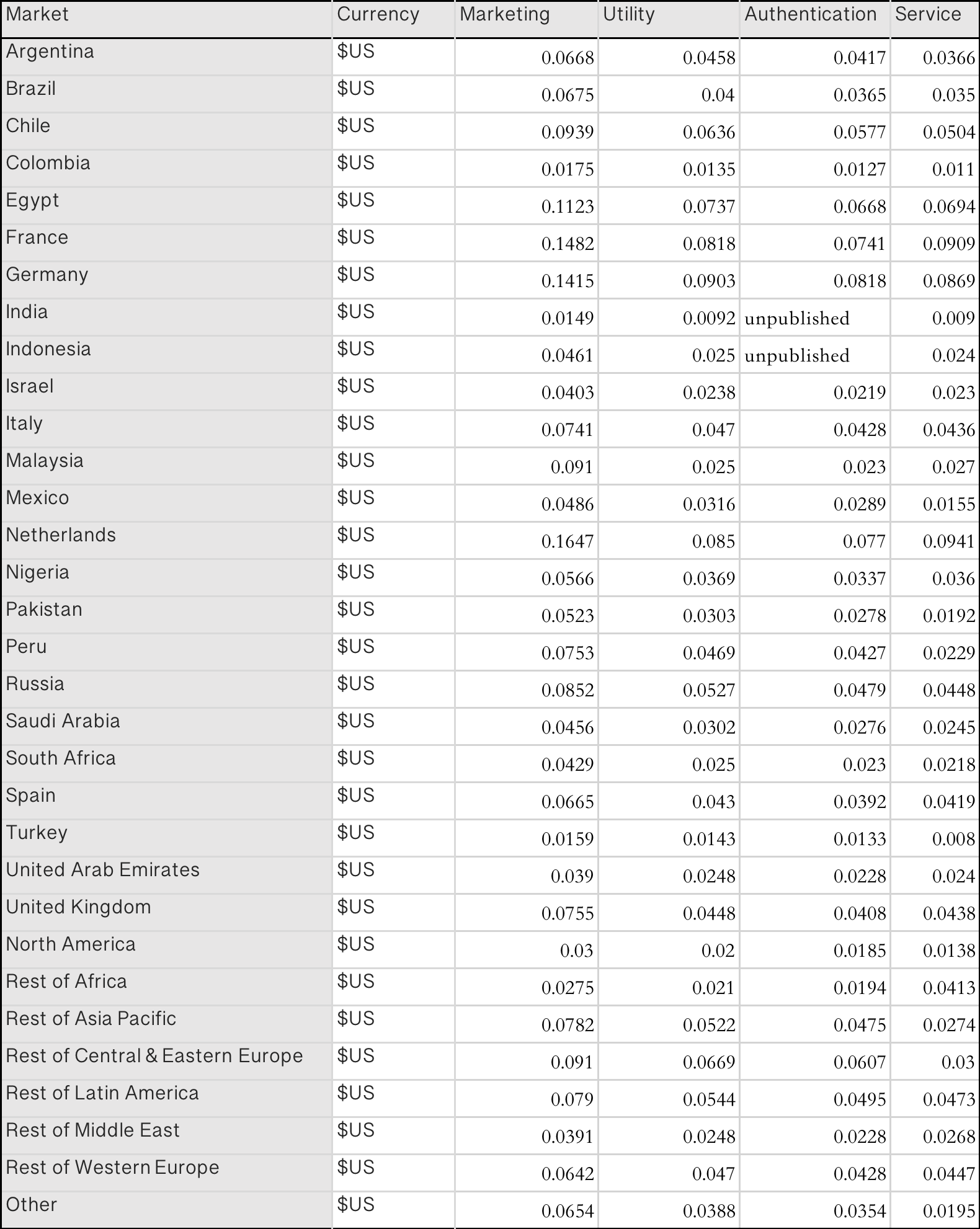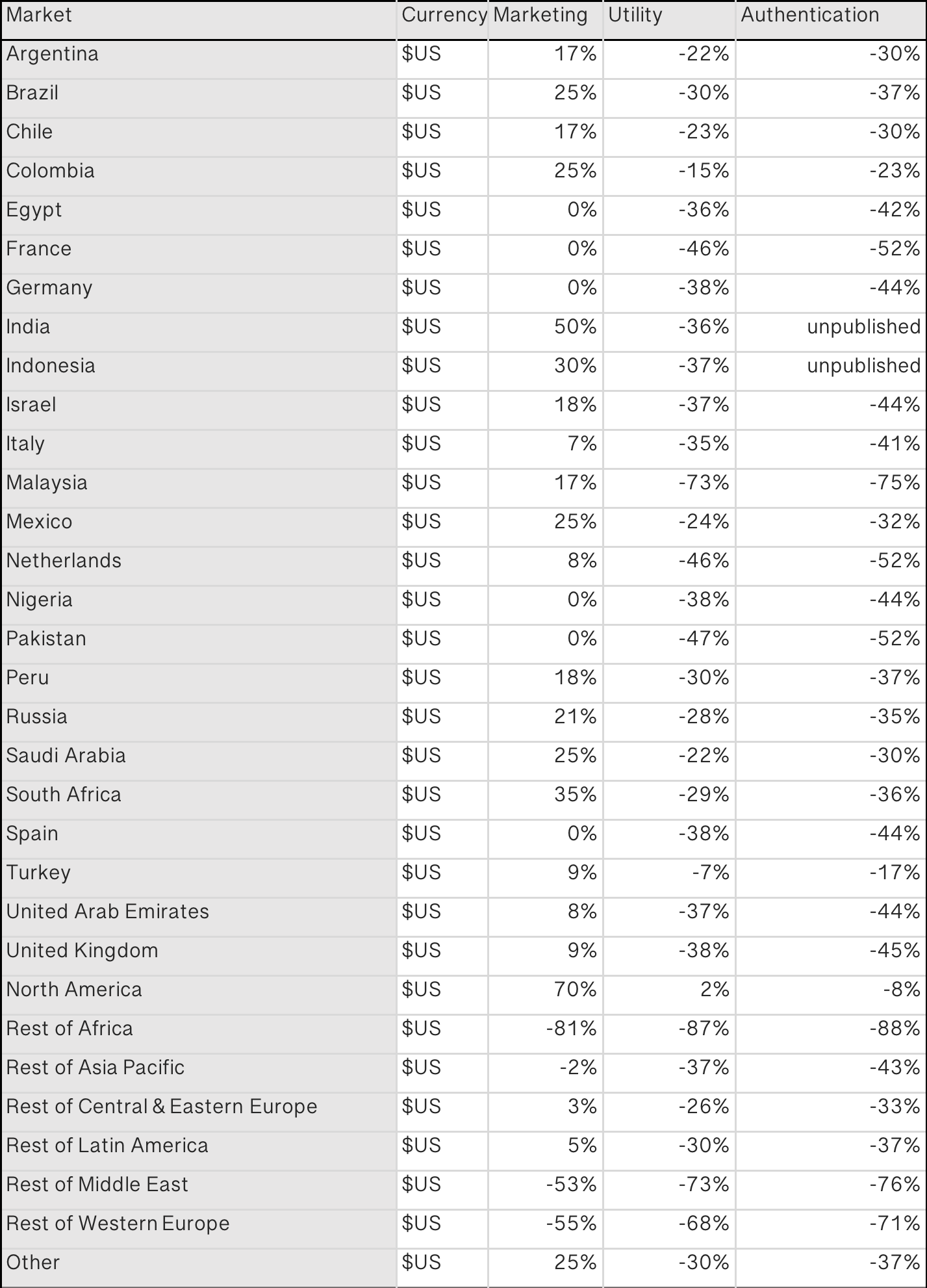Pricing Changes
Businesses using the WhatsApp Business Platform will be charged per 24-hour conversation, with different rates by conversation category. Today’s business-initiated conversations will be split into three new categories: utility, authentication and marketing. Today’s user-initiated conversations will be called service conversations.
Four new conversation categories
effective June 1, 2023
There are three business-initiated conversation categories (all of which require customer opt-in):
- Utility conversations - Facilitate a specific, agreed-upon request or transaction or update to a customer about an ongoing transaction, including post-purchase notifications and recurring billing statements
- Authentication conversations - Enable businesses to authenticate users with one-time passcodes, potentially at multiple steps in the login process (e.g., account verification, account recovery, integrity challenges)
- Marketing conversations - Include promotions or offers, informational updates, or invitations for customers to respond/take action. Any conversation that does not qualify as utility or authentication is a marketing conversation.
- service conversations – all user-initiated conversations will be categorized as service conversations, which help customers resolve enquiries.
How conversation charges will be initiated
Conversation charges will be based on the template category. When a template is delivered, it opens a new conversation of that category and incurs the charge of that conversation category, unless the template is delivered during an open conversation of that category. For example, if a utility conversation is open and a marketing template is delivered within that open conversation, a new, separate marketing conversation is opened and marketing conversation charge is initiated.
However, sending multiple templates of the same category within an open conversation will not incur additional charges. For example, a business can send multiple utility templates in an open utility conversation with no additional charges.
Service conversations will still only be initiated when no other conversation window is open and a business responds to a user with a free form message within the 24-hour customer service window. If a business replies to a user with a template message or sends a template message in an open service conversation, this opens a new conversation based on the template category.
The exception to this is free entry point conversations. During the free window, businesses can send multiple templates of different categories, and no new conversation will be opened.
Charges for conversations are based on the user’s country code. A user here is defined as the customer that your business is communicating with. Rates for business-initiated and user-initiated conversations vary by country or region.
Pricing change
Effective June 1, 2023
YCloud new price
Changes to free entry point conversations
Effective March 1, 2023
Conversations are not charged when users message businesses using call-to-actions buttons on Ads that Click to WhatsApp or Facebook Page call-to-action buttons. Starting March 1, we are providing more free conversations when users message businesses through these entry points by extending the free conversation window from 24h to 72h.
When a free entry point conversation is open, no other conversation category can be opened, even if a business sends a template within the three-day (72h) free entry point conversation window.
Standard pricing applies for Ads that Click on WhatsApp. The conversation that initiates from the ad is free, but not the ad itself.
Changes to Free Tier Conversations
Effective June 1, 2023
Businesses will continue to be able to trial the WhatsApp Business Platform with 1,000 free user-initiated conversations each month. Business-initiated conversations will no longer be included in the free tier.
Each WhatsApp Business Account (WABA) will receive 1,000 free user-initiated conversations per month (independent of the number of phone numbers attached to the WABA). The free tier is refreshed monthly based on the timezone associated with the WABA.
Launch Timeline
| 2023.2.2 | New template categories are live, category selection is not validated as part of template review and approval until April 1 (templates can be approved with categories that don’t match our categorization prior to April 1). |
| 2023.3.1 | Free entry point conversation windows extended from 24h to 72h (3 days). |
| 2023.3.17 | YCloud template API accepts new categories. If you are using this API, please be sure to adjust it before May 1, 2023. https://docs.ycloud.com/reference/whatsapp_template-create |
| 2023.3.27 | Begin the first template category migration on March 27, 2023 (2023-03-27T00:00:00 Pacific Daylight Time, UTC-O7:00) and expect to finish April 1, 2023. |
| 2023.4.1 | 1. Template category validation is now part of the template review. 2. First template category migration of old template categories to their new categories and migration results available for review. 3. New template rejection reason is now available. Visible in template status webhooks and the WhatsApp Manager. 4. Template sample variables are now required for any templates that use variables. |
| 2023.5.1 | 1. New template categories are required for all API versions and template category validation performed on any template created or edited via any API version. 2. Authentication templates with one-time password buttons are available to all businesses except businesses based in India. |
| 2023.5.5 | Final template category migration, for any templates created between April 1 and May 1. |
| 2023.5.15 | Template categorization appeal process closed; no appeals allowed for templates migrated on April 1 or May 5 after this date. |
| 2023.5.29 | All newly created authentication templates must include a one-time password button. |
| 2023.6.1 | 1. New conversation rates now apply to all businesses. 2. Free-tier conversations only include service conversations. This now applies to all businesses. 3. Multiple conversation windows are now possible. 4. Message status webhooks now include new pricing information. 5. Conversation metrics now reflect the new template categories and pricing. 6. Payload value restrictions now apply when sending authentication templates via Cloud API. |
对话收费调整
从2023.6.1 日起,WhatsApp Business platform 将对原先的对话收费进行调整。具体调整方案如下:
1、对话将被分为4种类型
(1)服务型对话——由用户主动发起的对话
原先商家发起的对话被分为3种类型。根据发送消息时选用的模板类型为准。
(2)营销对话—— 由Marketing类型的消息模板开启的对话。
(3)通知对话—— 由Utility类型的消息模板开启的对话。
(4)验证对话—— 由Authentication类型的消息模板开启的对话。
2、每种对话类型都会以24小时为单位单独计费
对话费用将基于模板类别。发送对应类别的模板消息时,它会打开该类别的新对话并产生该对话类别的费用。例如:商家主动发了一条营销类别的模板消息后,再发一条验证码模板消息。分别收取一次营销对话费用和验证对话费用,分别开启营销对话窗口和验证对话窗口。
发送同一类别的多个模板不会产生额外费用。例如:商家发送了一条通知类别的模板消息,开启了通知对话窗口,接下来的24小时内发送多个通知类别的模板消息不收费。
服务类型的对话只允许商家用非模版类型消息(即自由格式的消息)回复。例如:用户主动向商家的WhatsApp商业账号发送消息,商家如果发送自由格式的消息回复,则开启服务型对话;如果商家通过模板消息回复,将依旧会被视为商家发起的3种类型对话之一,也会以相对应的对话类型收费(而不是以服务类型对话收费)。
3、价格修改
以上提到的4种类型的对话都有自己的定价。
YCloud 2023.6.1号 最新售价:

3、可同时开启多个对话窗口(收费模式修改)
原先24小时之内只能产生1次对话窗口,现在24小时之内可根据以上4种类型产品各自开启24小时的对话。
举例:商家主动发了一条营销的模板消息后,再发一条验证码模板消息。这时会同时开启营销对话窗口和验证码对话窗口,分别收取一次营销对话费用和验证对话费用。
4、广告产生的免费对话时间延长至72小时
从广告中进入WhatsApp商业账号进行免费对话的时间从24小时延长到72小时,且期间不会打开另外的类型的对话窗口。
5、每月前1000个免费对话修改
改为:每月前1000个免费的用户发起的对话。
6、提交模板时所有模板的示例必填。
执行时间点(太平洋夏令时间)
——3月1 日
广告产生的免费对话时间延长至72小时。
——4月1日
(1)完成首次模板迁移,WhatsApp将原来的旧的模板全部进行重新分类。
(2)接口模板提交时必须包含模板示例
——5月1日
提交模板时必须按照新的模板类型进行提交。YCloud已兼容新的模板接口。
——5月5日
迁移4月1到5月1日新产生的模板。
注意:如果对老的模板的重新分类有异议的,可进入BM后台模板页面进行申诉,申诉最晚时间为5月15日。
——6月1日
(1)正式使用新的模板类型和定价。
(2)每月1000条免费对话不再包括商家发起对话
价格解读
新的价格方案中,原先商家发起的对话被拆分为3种类型。我们看看这3种类型对话价格较之前的变化(数字为增减百分比)

可以看出:
1、营销类型的对话:
在大部分国家/地区开展WhatsApp营销对话的成本上涨;即便如此,某些地区WhatsApp的营销成本上相较于短信仍然保有很大的优势,可以重点关注:哥伦比亚、印度、印尼、俄罗斯、土耳其、以色列。
非洲、中东、西欧等地区的价格大幅下调,最多下调超过80%
2、通知类型的对话:
除北美地区外,所有国家/地区产生的通知类型对话价格大幅下降;
某些国家/地区下调后的价格远低于国际短信,包括:埃及、法国、德国、马来西亚、尼日利亚、巴基斯坦、西班牙、非洲、亚太、中东、西欧地区
3、验证类型的对话:
比通知类型的对话价格更低
对于WhatsApp 覆盖率极高的两印地区,当前仍未最终公布,或许可以期待更低的价格
新价格实行后的建议
1、采用WhatsApp来发送验证码和通知消息
从公布价格看,WhatsApp大力支持验证和通知类消息的推送,帮助商家降低基础通讯成本。在WhatsApp高覆盖地区,例如印尼、印度、巴基斯坦、尼日利亚等国家/地区,我们建议你可以默认通过WhatsApp来发送验证码/通知, 并通过WhatsApp失败状态即时补发短信。在保障用户体验的同时,大大降低了基础通讯成本。
2、保证模板性质的唯一性
5月1日开始,WhatsApp在审查消息模板的过程中增加模板类型审核。在创建模板时,无论选择哪种类别进行提交,任何混合了营销内容的模板都将被归类为营销模板。如果发送消息的目的是通知用户某些明确的事项,例如订单通知、物流通知,请确保在创建消息模板中不夹带营销倾向,以便使用更低的通知对话价格。
3、引导用户发起互动
设计吸引用户互动的消息模板,一旦用户主动向你的账号回复消息,在这个对话周期内将可以免费使用自由格式的消息与它们互动。
充分利用这段时间,把原本打算使用的模板消息替换为自由格式的消息。
Updated about 2 months ago
